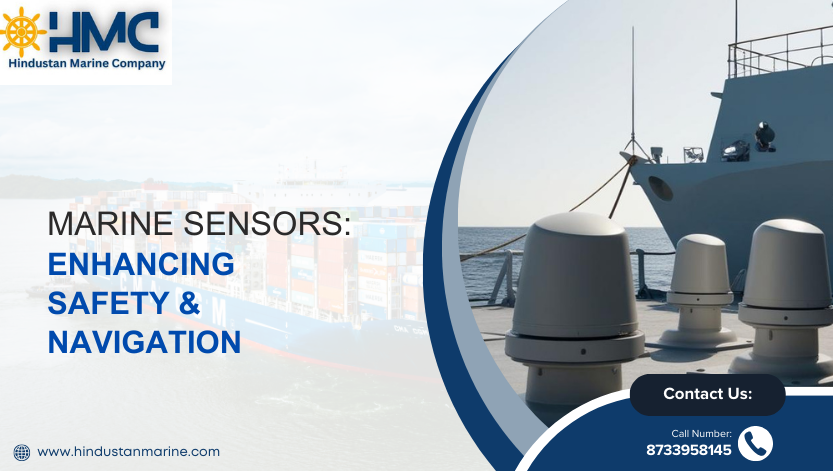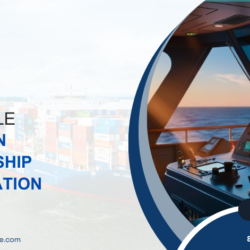
Marine Sensors: Enhancing Safety & Navigation
Precision, safety, and efficiency in the maritime industry today cannot be compromised. Marine sensors have become the backbone of modern navigation. It can provide real-time data for better situational awareness, tracking vessels, avoiding collisions, and monitoring the environment.
That is what we at Hindustan Marine Company understand, the transformative impact of these technologies in helping to redefine marine operations all over the world.
This blog will describe how Marine Sensors enhance safety and navigation in the Maritime.
The Role of Marine Sensors in Maritime Safety
Safety at sea represents a cooperative effort of various advanced sensors to deliver navigation data accurately. Installation of technologies like GPS, GNSS, and IMUs ensures that the vessels are kept on course under the harshest of conditions. AIS provides an added layer of safety by identifying vessels, tracking targets in real-time, and facilitating the exchange of information.
Meanwhile, radar and LiDAR systems provide unparalleled obstacle detection, these technologies now efficiently allow the vessels to navigate under the conditions of poor visibility.
Key Marine Sensor Technologies for Safety:
- GPS & GNSS: To give an exact position and optimize a path for the vessel.
- IMUs: To keep navigation information even in GPS-denied environments.
- AIS: To identify and track in real-time vessels.
- Radar & LiDAR: For object detection and safe maneuvering.
- Visual Sensors: For detection of objects, supporting the process of autonomous navigation.
Preventing Collisions: Sensor-Driven Solutions
The effect of accidents at sea can result in catastrophic consequences. The use of advanced marine sensors is important in such cases. They integrate radar systems with the AIS to produce a real-time map on which vessels can detect and respond to hazards before encountering them.
The transmitted data are from AI-driven sensor algorithms that continually analyze information to predict and prevent collisions. Maritime IoT solutions continuously update the navigation routes through the sensor inputs.
Enhancing Decision-Making with Smart Sensors
Predictive analytics with marine sensors enable vessels to change their routes based on real-time information. Detecting icebergs, monitoring other vessels, and similar actions ensure informed decisions by the crew that eventually reduce the number of maritime accidents.
Environmental Monitoring
Marine sensors serve the function of safety and environmental conservation as they can monitor real-time weather conditions, water quality, and pollution levels; all of these are essential for vessels to comply with the world’s environmental regulations. Remote emission monitoring using satellite sensors as well as IoT platforms; allows for a sustainable maritime operation. These include:
Key Applications in Environmental Monitoring:
- Weather Sensors: Monitor oceanic and atmospheric conditions for routing optimization
- Water Quality Sensors: Enable identification of pollutants to check on environmental compliance.
- Satellite-based Monitoring: Macro-level view of the marine ecosystems.
- Emission Monitoring Platforms: Fuel economy and carbon emissions report.
Vessel Performance Optimization with Marine Sensors
Efficiency and reliability are crucial in the maritime sector. Marine sensors monitor various parameters, such as engine performance, speed, stability, and wind conditions, to ensure optimal operations.
Performance-Enhancing Marine Sensors:
- Engine Sensors: Monitor RPM and thrust to optimize fuel consumption.
- Echo Sounders & Speed Logs: Aid navigation with accurate depth and speed data.
- Stabilizer Sensors: Improve vessel stability in rough waters.
- Wind Anemometers: Assist in strategic route planning and fuel efficiency.
The Future: Sensor Fusion & Autonomous Navigation
The future holds autonomous navigation, and marine sensors would significantly contribute to it. By sensor fusion, AIS, radar, LiDAR, and satellite sensor data are integrated into a full situational awareness model. Such models would enhance unmanned cargo ships into the precision levels expected in AI and ML-driven navigation systems.
Advantages of Autonomous Marine Technology:
- Safety: Reduces the chances of human errors and collision risks.
- Cost-effective: Decreases operational costs by optimizing routes.
- Environmental-friendly: Improved fuel efficiency and fewer emissions.
Final Words
The maritime industry is rapidly evolving, with marine sensors at the forefront of this transformation. From ensuring navigation safety to optimizing vessel performance, these technologies are indispensable. Hindustan Marine Company remains committed to integrating cutting-edge sensor solutions that enhance safety, efficiency, and environmental sustainability across global waters.
Investing in marine sensors today is investing in a safer and smarter maritime future. Reach out to us to explore the latest products in marine navigation and vessel monitoring.



 Fast Delivery
Fast Delivery Easy Returns
Easy Returns Instant Quote
Instant Quote Product Demo
Product Demo